Disclosure: This article contains affiliate links. We may earn a commission from purchases at no extra cost to you, which helps our travel content.
The predawn air hung thick with humidity as I laced up my running shoes outside my modest guesthouse in Menteng. Five days into my Jakarta visit, I'd established a rhythm: early morning runs through the awakening city, followed by culinary explorations that stretched well into the evening. Jakarta wasn't on my original itinerary – I was supposed to be in Bali preparing for a charity marathon – but a volcanic eruption had rerouted my journey, and I found myself with an unexpected week in Indonesia's pulsing capital. What began as a logistical inconvenience transformed into one of those beautiful travel accidents that reshape your understanding of a place. Jakarta, I quickly learned, speaks its most authentic cultural language through food – from humble street carts to upscale establishments where colonial history and modern Indonesian identity engage in a fascinating dialogue. This guide is my love letter to a city that feeds both body and soul, proving that sometimes the most meaningful cultural connections happen over a shared plate of nasi goreng at 2 AM.
Street Food Symphonies: Jakarta's Sidewalk Culinary Orchestra
Every city has its rhythm, but Jakarta's beats through its street food scene with a particular intensity that reminds me of vinyl shopping in Tokyo's Shimokitazawa district – both experiences requiring a willingness to get lost in narrow passages where the best treasures hide.
My journey began at Jalan Sabang, where food carts (known locally as kaki lima – five feet, for the three wheels and two vendor's legs) line up as evening falls. Here, I discovered kerak telor, a spicy omelette with glutinous rice that serves as Jakarta's signature street dish. The vendors prepare it with theatrical flair, flipping the rice-egg mixture with practiced precision before adding dried shrimp and coconut.
But the true revelation came at Kota Tua (Old Town) where, after a morning run through colonial architecture, I stumbled upon a vendor selling ketoprak – rice vermicelli with tofu, bean sprouts, and peanut sauce. The elderly gentleman preparing it had, as he told me through my translation app (which became my most essential travel tool), been making ketoprak in the same spot for 47 years.
"Food is memory," he said as he sprinkled fried shallots over my bowl. "When you eat my ketoprak, you taste my history."
At Glodok, Jakarta's vibrant Chinatown, the fusion food speaks to the city's multicultural identity. Here, Chinese culinary traditions blend seamlessly with Indonesian ingredients. The bakmi noodles at a tiny stall called Bakmi Aboen (you'll recognize it by the perpetual line) offers a masterclass in cross-cultural dialogue – Chinese wheat noodles swimming in distinctly Indonesian spices.
Perhaps my favorite discovery came during a pre-dawn run when I encountered bubur ayam vendors setting up for the morning rush. This rice porridge with chicken, served with a constellation of condiments, became my post-run ritual – the perfect combination of protein and carbs to refuel while watching the city wake up around me.
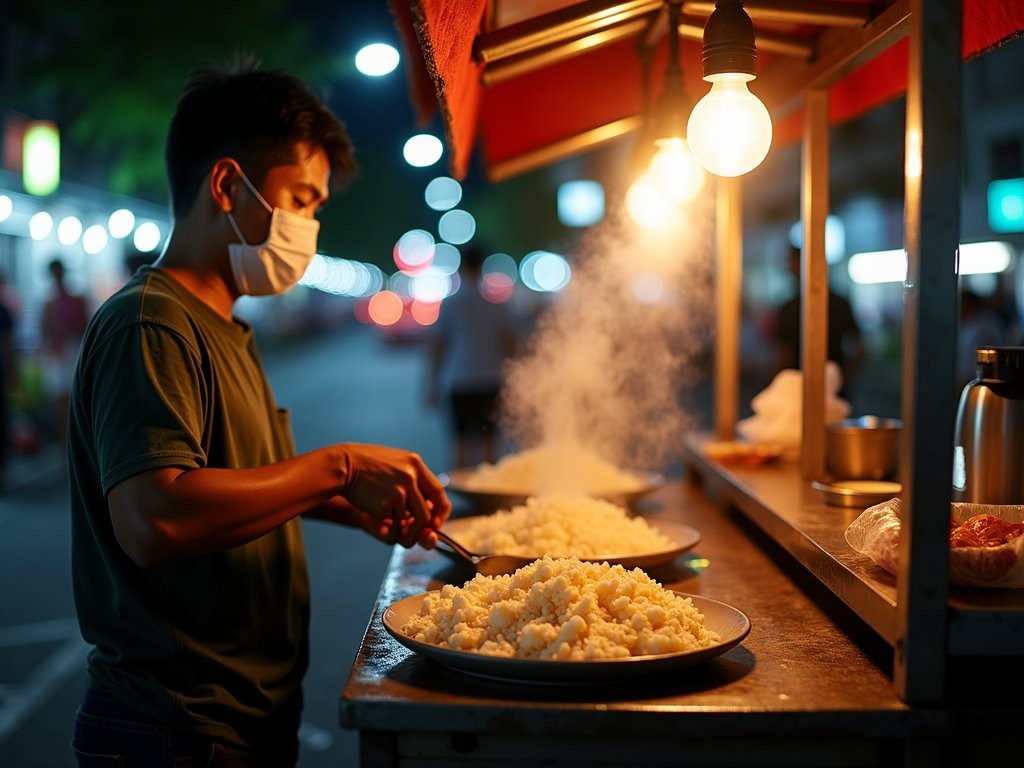
💡 Pro Tips
- Follow locals during lunch hours – they always know the best stalls
- Carry small bills (rupiah) as vendors rarely have change for large denominations
- Look for busy stalls with high turnover – it ensures freshness and reduces food safety concerns
Warungs & Local Eateries: The Heartbeat of Jakarta's Food Culture
If street food represents Jakarta's improvisational jazz, then warungs – small family-owned eateries – deliver its soulful blues standards. These establishments occupy that perfect middle ground between street stalls and formal restaurants, offering seated dining without pretension or high prices.
My first warung experience came recommended by Adit, a fellow runner I met during a spontaneous 5K around the Monas monument. "You want real Jakarta food?" he asked between breaths as we circled the national monument. "Not tourist Jakarta food?" His recommendation led me to Warung Ibu Imas in Menteng, where I discovered nasi uduk – coconut rice served with various sides – that redefined comfort food for me.
What makes warungs special isn't just the food but the communal experience. At most establishments, you'll find yourself seated at shared tables, often leading to conversations with locals. During one meal at Warung Sulawesi, I found myself in an impromptu Indonesian language lesson with a group of university students who insisted I learn proper pronunciation for ordering ayam penyet (smashed fried chicken with sambal).
Padang restaurants represent another essential Jakarta dining experience. These Sumatran-style establishments display dozens of prepared dishes in the window. The serving style is unique – waiters bring everything to your table, stacking plates in an impressive tower, and you pay only for what you eat. At Rumah Makan Minang near Sarinah, I watched in awe as a server balanced fifteen dishes on one arm. The rendang (slow-cooked beef in coconut milk and spices) proved why it frequently tops world's best food lists.
For those with dietary restrictions, I found Warung Vegetarian Alami near Kemang to be a revelation. The owner, a former monk who spent time at the same Thai monastery where I first discovered running meditation, creates plant-based versions of Indonesian classics that sacrifice nothing in flavor.
Before visiting these local institutions, I downloaded the offline translation dictionary which proved invaluable for deciphering menus and communicating specific dietary needs. While many Jakarta residents speak some English, having translation tools handy demonstrates respect for local culture and opens doors to more authentic experiences.
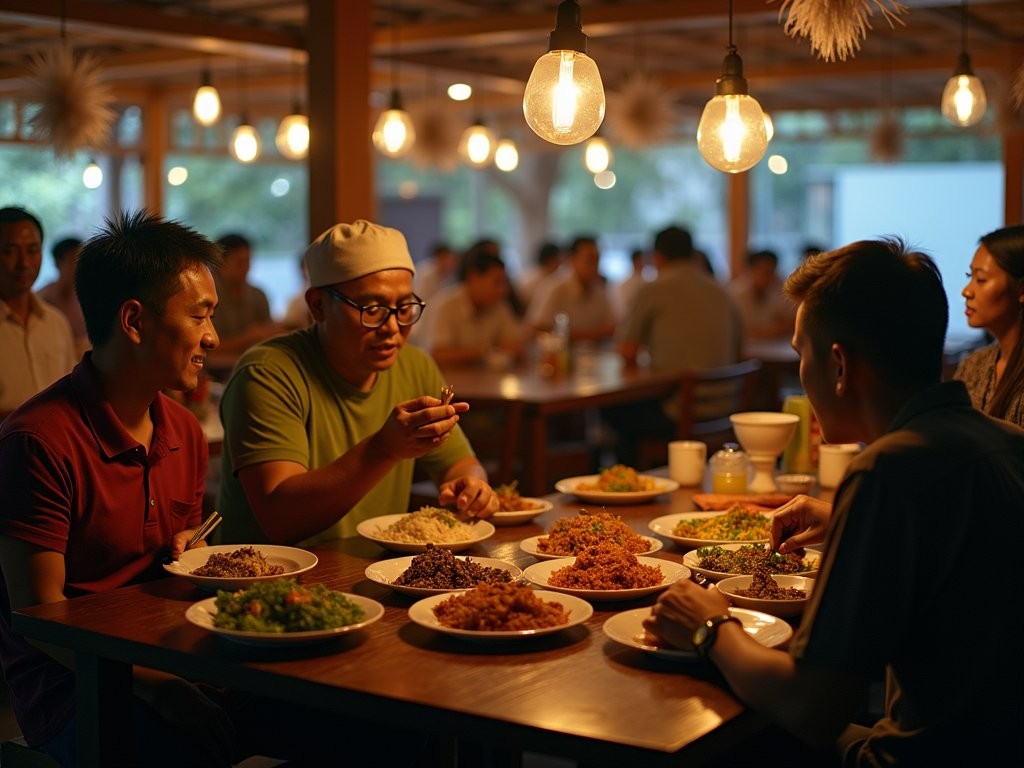
💡 Pro Tips
- Ask for 'tidak pedas' if you want less spicy food – Indonesian default spice levels can be intense
- Most warungs are cash-only establishments
- Lunch hours (12-2pm) offer the freshest selection before popular items sell out
Mall Food Courts: Jakarta's Unexpected Culinary Laboratories
My fascination with mall culture began years ago during volunteer work in Bangkok, where I discovered that shopping centers often reveal more about local life than tourist attractions. Jakarta elevates the mall food court to an art form, creating culinary destinations that locals genuinely frequent rather than tourist traps.
Grand Indonesia's food court offers perhaps the most comprehensive introduction to Indonesian cuisine under one roof. During my third day in Jakarta, I spent nearly five hours here, methodically sampling small portions from different vendors. The bakso (meatball soup) stall operated by a third-generation family business became my favorite, their clear broth housing marble-sized beef meatballs with a perfect texture – springy but yielding.
What fascinated me most about Jakarta's mall food courts is their democratic nature. At Plaza Indonesia, I watched business executives in tailored suits sitting alongside delivery drivers and shop workers, all enjoying soto ayam (chicken soup) from the same vendor. Food becomes the great equalizer in a city with otherwise stark economic contrasts.
For those seeking regional specialties, Kota Kasablanka mall houses vendors representing Indonesia's diverse culinary landscape. Here I discovered papeda (sago porridge) from Papua, served with yellow fish soup – a dish rarely found in standard restaurants catering to international visitors.
Plaza Senayan's Food Hall deserves special mention for its upscale food court concept that maintains accessibility. The laksa (spicy noodle soup) vendor here creates a version that balances coconut richness with chili heat in a way that haunted my dreams for weeks afterward.
During long exploration days, I relied heavily on my insulated water bottle to stay hydrated in Jakarta's relentless humidity. The city's mall culture actually supports sustainability efforts, with many food courts offering filtered water stations where you can refill rather than purchasing single-use plastic bottles.
Mall food courts also provide an excellent opportunity to observe Jakarta's youth culture. At Mal Kelapa Gading, I watched teenagers create content for social media, carefully arranging colorful dishes like es campur (mixed ice dessert) for the perfect shot before digging in – a reminder that food serves both physical and social functions in contemporary Indonesian society.
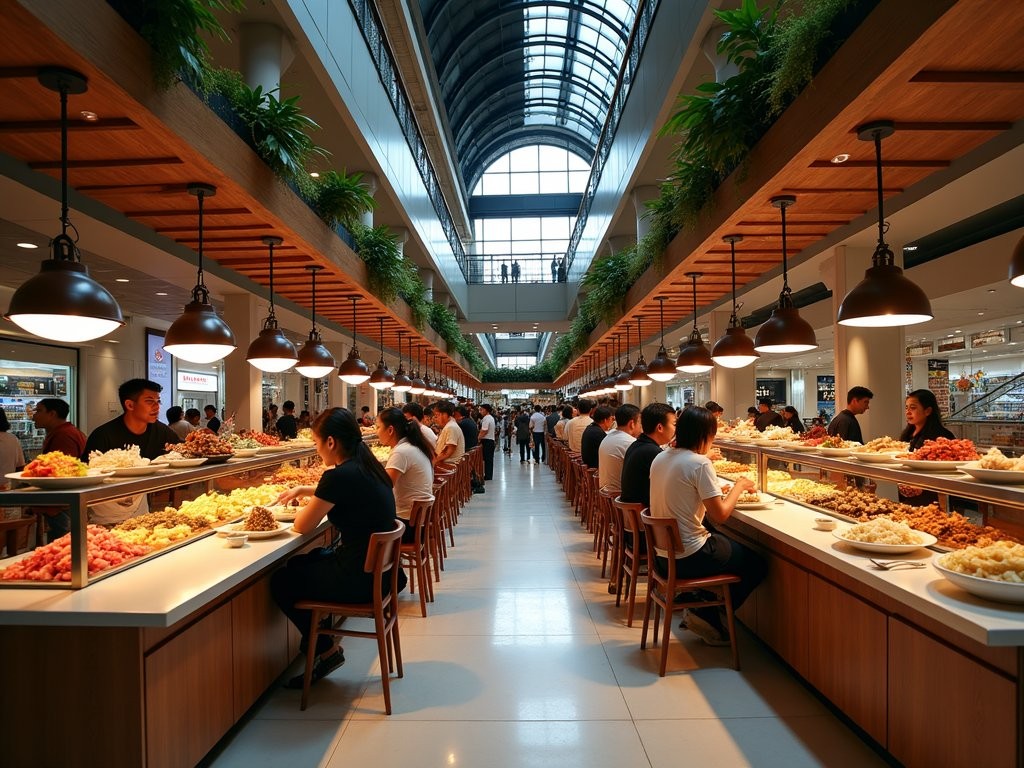
💡 Pro Tips
- Visit food courts during off-peak hours (3-5pm) to avoid crowds and get more attention from vendors
- Many mall food courts offer 'small portion' options perfect for sampling multiple dishes
- Look for stalls with electronic ordering systems – they often offer English language options
Coffee Culture: Jakarta's Third Wave Revolution
Every runner knows the sacred relationship between caffeine and endurance, but Jakarta's coffee scene transcends mere functionality. Indonesia – one of the world's premier coffee producers – has in recent years developed a sophisticated urban coffee culture that rivals global capitals while maintaining distinctly local characteristics.
My coffee journey began at Filosofi Kopi in Melawai, a pioneer in Jakarta's third-wave movement. Founded by a writer and inspired by his novel of the same name, the café later inspired a national film – evidence of coffee's cultural significance in contemporary Indonesia. Their signature drink, Es Kopi Filosofi, balances locally-sourced Sumatran beans with just enough palm sugar to highlight rather than mask the coffee's natural chocolate notes.
What struck me most about Jakarta's coffee scene is its connection to Indonesia's colonial history. At Kopi Tuku in Cipete, I chatted with barista Dian about how kopi tubruk (traditional Indonesian coffee where grounds are boiled directly with sugar) represents a form of cultural resilience – a brewing method that persisted through Dutch colonization despite European attempts to control coffee production and preparation methods.
"When we make pour-overs with single-origin Indonesian beans," Dian explained while demonstrating precise pouring technique, "we're reclaiming our coffee narrative."
For those seeking a deeper understanding of Indonesian coffee, Anomali Coffee offers cupping sessions where you can sample beans from across the archipelago – from the earthy Gayo beans of Sumatra to the bright, clean notes of Flores coffee. The regional distinctions mirror Indonesia's cultural diversity, each island contributing unique characteristics to the cup.
Coffee shops also function as Jakarta's co-working spaces. At Common Grounds in Senopati, I found myself finishing this very blog post surrounded by creative professionals and digital nomads. The café's commitment to showcasing local beans alongside international offerings creates a global-local dialogue that reflects Jakarta's evolving identity.
My morning runs always concluded at One Fifteenth Coffee, where I'd reward myself with their exceptional cold brew while recording observations in my travel journal. Their minimalist space provided the perfect environment for reflection, and their baristas took genuine interest in my marathon training, eventually recommending a running route that took me through neighborhoods I would have otherwise missed.
For serious coffee enthusiasts visiting Jakarta, I recommend picking up a hand grinder to prepare fresh beans in your accommodation. Many cafés sell whole beans, allowing you to recreate your favorite Jakarta coffee experience long after your visit ends.
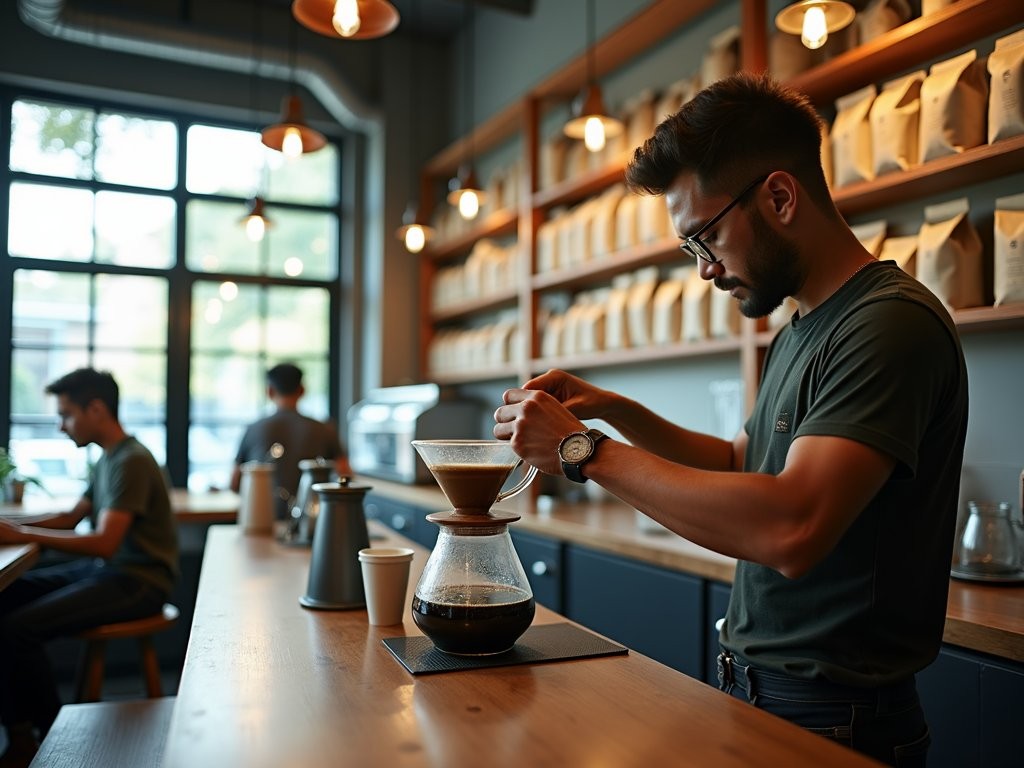
💡 Pro Tips
- Most specialty coffee shops open later (around 8-9am) than traditional coffee vendors
- Ask baristas about the origin of their beans – they're usually passionate about sharing Indonesia's coffee heritage
- Try both traditional preparation methods and modern espresso drinks for a complete experience
Fine Dining Reimagined: When Traditional Flavors Meet Modern Technique
While budget travel defines most of my journeys, I believe in occasional culinary splurges that offer deeper cultural understanding. Jakarta's fine dining scene provides fascinating insight into how Indonesia positions itself in global gastronomy conversations while honoring traditional flavors.
Namaaz Dining represents the pinnacle of this approach. Chef Andrian Ishak, often called Indonesia's Heston Blumenthal, creates molecular gastronomy interpretations of street food classics. His 17-course degustation transforms humble dishes into artistic statements – bakso appears as a crystal-clear consommé with a single perfect meatball sphere, while kerak telor becomes a deconstructed masterpiece with egg components prepared using various techniques.
What makes Jakarta's fine dining scene distinctive is its commitment to indigenous ingredients. At Kaum in Menteng, the restaurant works directly with tribal communities across Indonesia to source rare ingredients and preserve traditional recipes. Their babi guling (suckling pig) honors Balinese tradition while elevating presentation to contemporary standards.
The colonial legacy finds thoughtful exploration at Kunstkring Paleis, housed in a former Dutch art center. Here, Indonesian and Dutch culinary influences engage in a complex dialogue through dishes like rijsttafel – a Dutch colonial "rice table" featuring dozens of Indonesian dishes served simultaneously. The setting prompted reflection on how food becomes both an instrument of cultural domination and resistance.
For solo travelers on tighter budgets, I discovered that many upscale establishments offer bar seating with abbreviated tasting menus at lower price points. At Amuz, I enjoyed a three-course French-Indonesian fusion lunch at the counter for roughly one-third the price of their dinner service while chatting with the sommelier about Indonesian wine production challenges.
Perhaps most exciting is Jakarta's emerging generation of young chefs reclaiming their culinary heritage. At Nusa Indonesian Gastronomy, Chef Ragil Imam Wibowo documents disappearing recipes from remote islands, presenting them with contemporary technique but profound respect for tradition. His ikan kuah kuning (yellow fish soup) from Maluku islands connected me to a region of Indonesia I haven't yet visited but now plan to explore.
During my fine dining experiences, I appreciated having my pocket camera to discreetly document exceptional dishes. Unlike bulkier equipment that can disrupt the dining atmosphere, its compact size allowed me to capture culinary artistry without becoming that annoying person taking elaborate food photos.
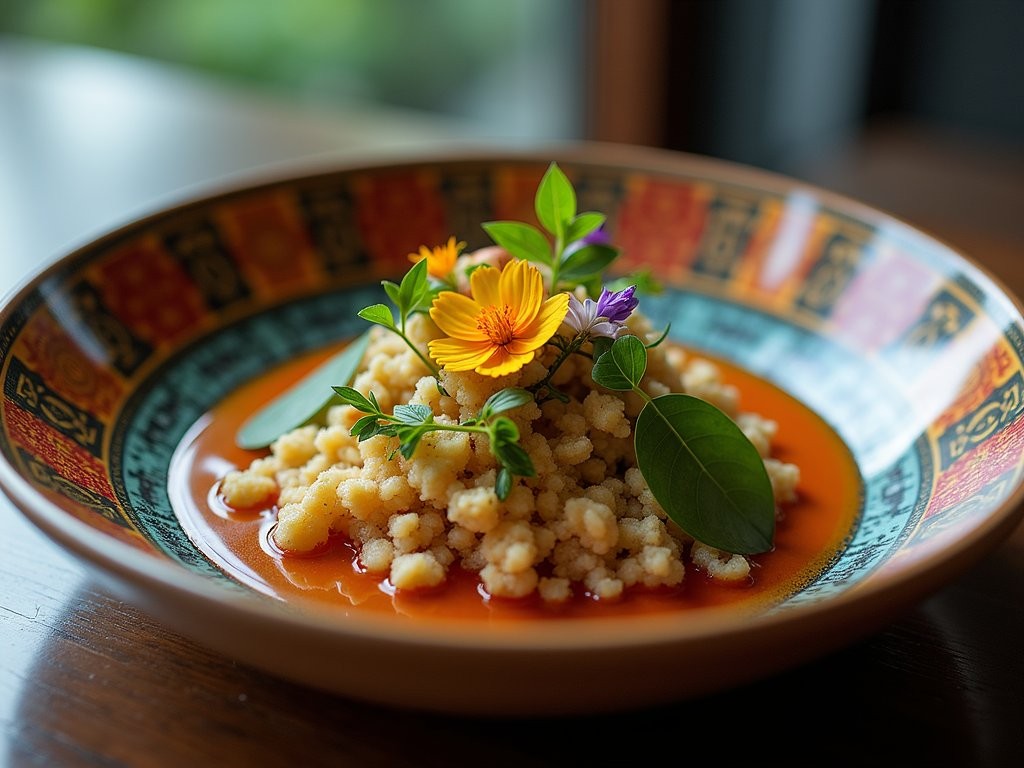
💡 Pro Tips
- Make reservations at least a week in advance for top restaurants
- Consider lunch service for more affordable fine dining experiences
- Ask about chef's regional specialties – many showcase their hometown dishes with special pride
Spiritual Dimensions: Food and Faith in Jakarta
My travels have consistently drawn me to spiritual centers – from monasteries in Thailand to temples in Japan – and Jakarta continued this pattern in unexpected ways. The city's religious diversity (housing significant Muslim, Christian, Buddhist, Hindu, and Confucian populations) creates fascinating intersections between faith and food that reveal deeper cultural values.
During Ramadan, which coincided with my visit, Jakarta transforms. I joined Muslim friends for iftar (breaking fast) at Masjid Istiqlal, Indonesia's national mosque. The communal meal began with dates and water – traditional foods to break the fast – before expanding to a feast shared with strangers who quickly became friends. The experience reminded me of monastery meals in Thailand, where food becomes both physical nourishment and spiritual practice.
Jakarta's Chinese-Indonesian community maintains fascinating food traditions at Jin De Yuan, the city's oldest temple in Glodok. During a morning visit, I observed offerings of fruit arranged in precise patterns, symbolizing abundance and gratitude. Later, at a nearby vegetarian restaurant run by temple volunteers, I enjoyed cap cay (stir-fried vegetables) prepared according to Buddhist principles of compassion.
Perhaps most interesting was discovering Jakarta's small but vibrant Brahma Kumaris community, which practices raja yoga and maintains a sattvic vegetarian diet believed to support meditation. Their community kitchen near Kemang welcomed me for a cooking demonstration where I learned to prepare sayur lodeh (vegetable coconut curry) with mindfulness practices incorporated into each step of preparation.
"When you chop vegetables," the instructor guided, "feel gratitude for the nourishment they provide. This becomes part of the meal's energy."
The Christian influence on Jakarta's food culture emerges most visibly during Easter and Christmas, when Batak and Manado communities prepare special feasts. At HKBP Church in Menteng, I was invited to a community lunch featuring arsik (spiced fish) that members explained represents Christ's presence.
What struck me most across these experiences was how food functions as a universal language across faith traditions. Whether breaking Ramadan fast, receiving Buddhist temple offerings, or sharing Christian communion, the act of breaking bread together transcends theological differences.
For travelers seeking these deeper connections, I recommend approaching religious communities with genuine curiosity and respect. Dress modestly when visiting religious sites, ask permission before photographing food offerings, and be open to unexpected invitations – some of my most meaningful Jakarta experiences came through spontaneous meal invitations after expressing sincere interest in spiritual practices.
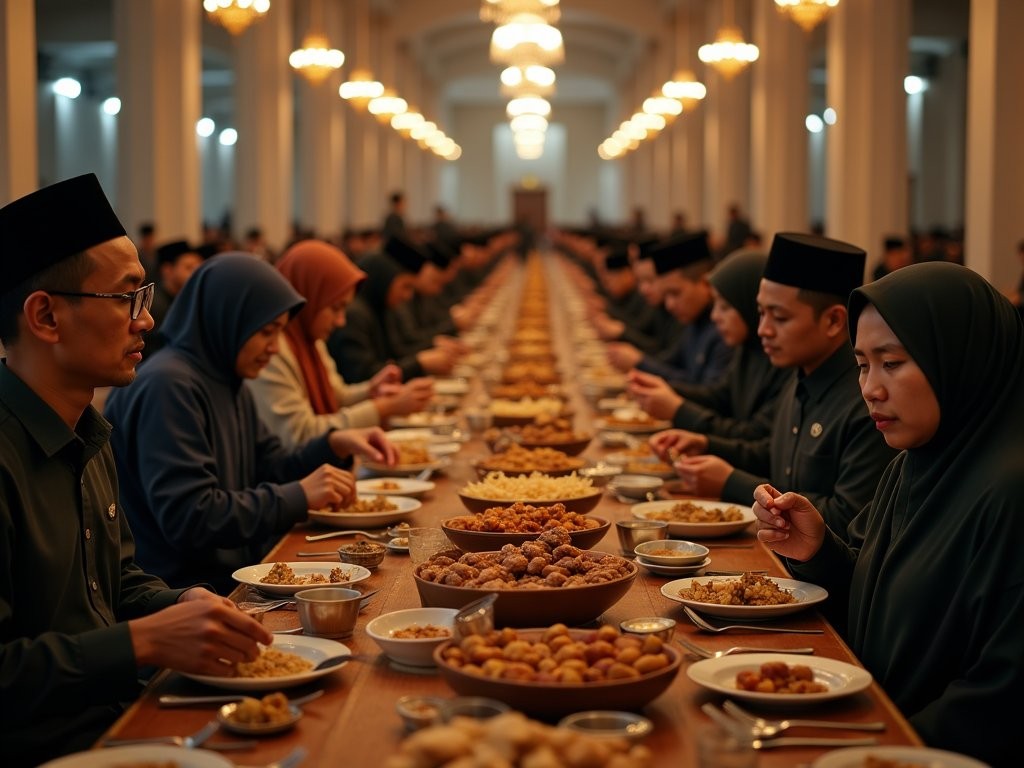
💡 Pro Tips
- Visit Istiqlal Mosque on Fridays when community meals often follow prayers
- Respect dietary restrictions when visiting religious communities – many Hindu and Buddhist sites maintain vegetarian kitchens
- Religious festivals often feature special foods not available year-round – research calendar events before your visit
Final Thoughts
As my unexpected week in Jakarta drew to a close, I found myself at a small warung near my guesthouse, sharing a final plate of nasi goreng with the family who'd been feeding me all week. "You'll come back?" asked Ibu Siti, the matriarch whose cooking had become my daily comfort. I nodded with genuine intention – Jakarta had revealed itself to me through its food in ways no guidebook could have prepared me for. From predawn bubur ayam after morning runs to late-night street food explorations, each meal had been a conversation with the city itself. Jakarta's culinary landscape serves as a perfect metaphor for Indonesia's broader identity – diverse regional traditions coexisting with global influences, history engaged in constant dialogue with innovation. Whether you're a budget traveler seeking authentic street food or someone looking to understand how fine dining interprets cultural heritage, Jakarta's food scene rewards the curious and hungry explorer. As I prepare for my rescheduled marathon in Bali, I carry Jakarta's flavors with me – not just as memories, but as a deeper understanding of how food connects us across seemingly insurmountable differences.
✨ Key Takeaways
- Jakarta's food scene offers authentic cultural insights at every price point – from street stalls to fine dining
- Food courts in malls provide an accessible introduction to regional Indonesian cuisines in comfortable settings
- Coffee culture reveals Indonesia's complex relationship with colonialism and agricultural heritage
- Religious diversity creates fascinating food traditions that welcome respectful visitors
📋 Practical Information
Best Time to Visit
year-round, though May-September offers less rainfall
Budget Estimate
$30-50/day excluding accommodation
Recommended Duration
5-7 days for culinary exploration
Difficulty Level
Beginner

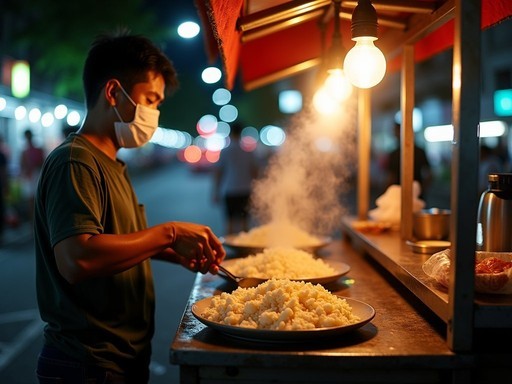
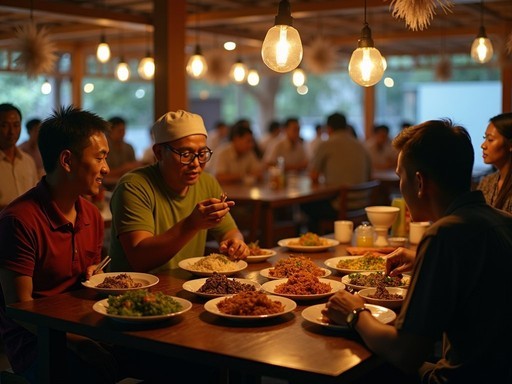
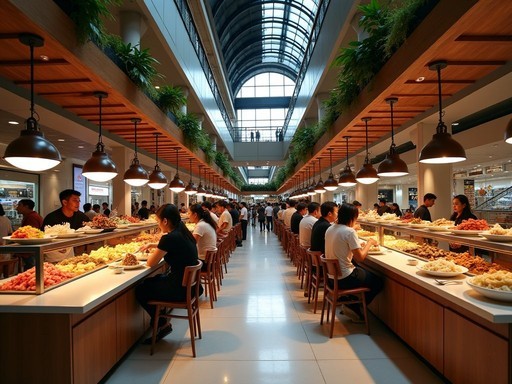
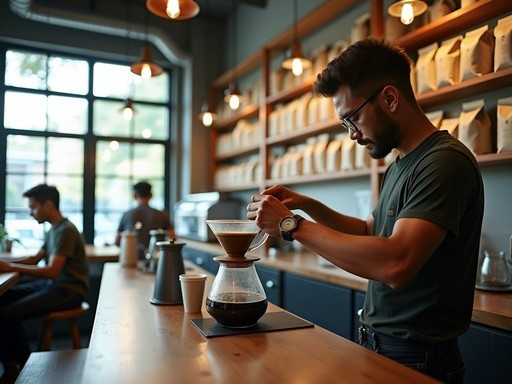
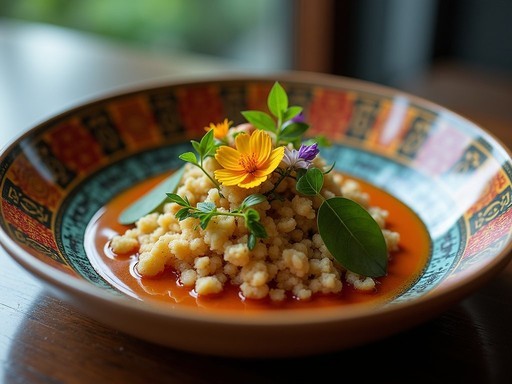
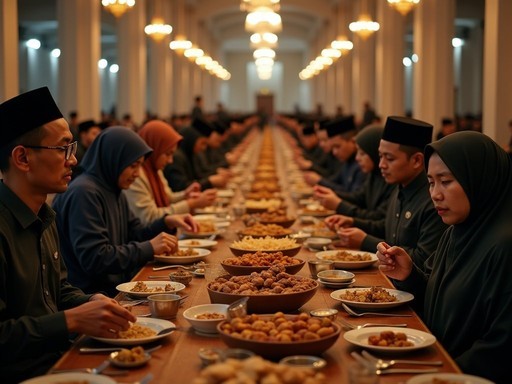


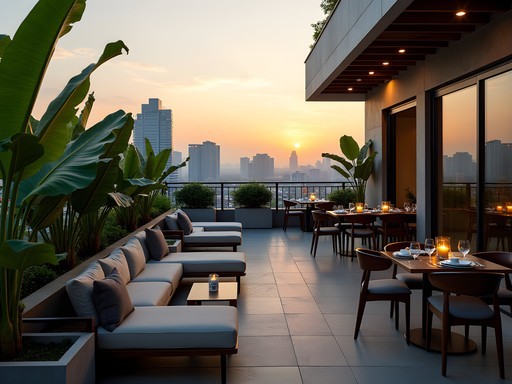
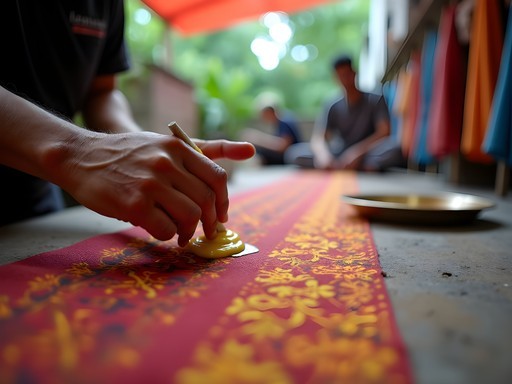
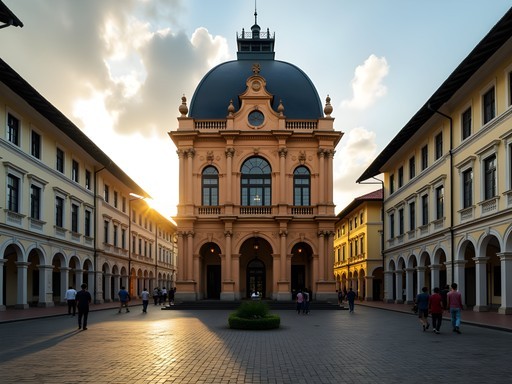
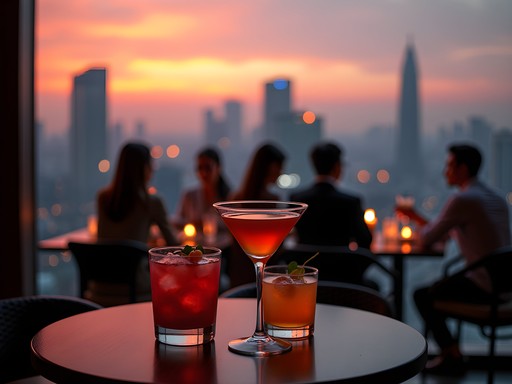
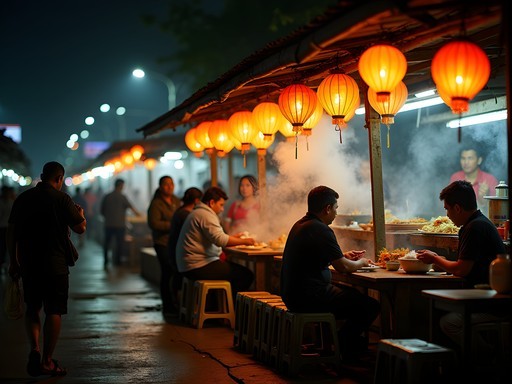
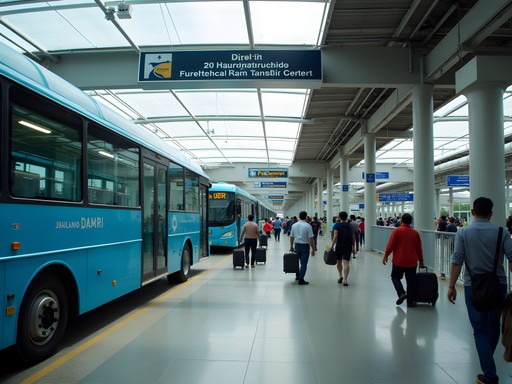

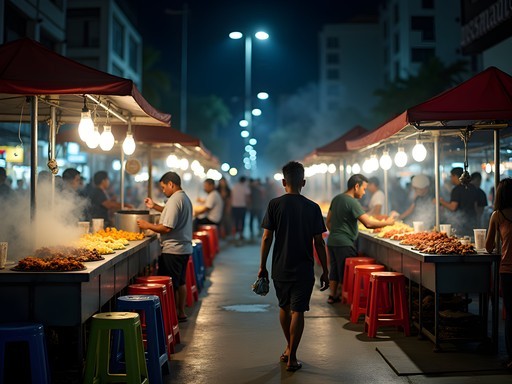
Comments
jakarta_local
As a Jakarta local, I'm so happy to see someone appreciating our food scene beyond the usual tourist spots! If you come back, try visiting Pasar Santa on weekends - lots of young food entrepreneurs are creating amazing fusion dishes there. And the martabak at Martabak Pecenongan 65A is a must-try for anyone visiting!
Mason Sullivan
Thanks for the insider tip! Pasar Santa is going on my list for next time. I did try martabak but missed that spot - sounds like I need a return trip!
noodle_hunter
Those mie ayam pics have me drooling! Bookmarked for my trip next year!
travel_with_mei
Great post! I'm planning a trip to Jakarta and I'm a bit nervous about street food safety. Any tips on how to choose which stalls are safe to eat at?
skywalker
Look for the busy stalls where locals eat! That's always worked for me. And if you're really worried, stick to freshly cooked hot foods.
Mason Sullivan
What @skywalker said is spot on. I'd add: watch for stalls that cook to order rather than having food sitting out, and bring hand sanitizer. Most importantly, don't miss out on the street food experience - it's the heart of Jakarta's culinary scene!
Bryce Diaz
Mason, your running route through Menteng is exactly how I started my mornings in Jakarta too! There's something magical about watching the city wake up while dodging motorbikes and food carts setting up. I'd add one spot to your list - there's a small warung called Warung Mapan near Cikini station that serves the most incredible rendang I've ever tasted. The owner learned the recipe from his grandmother in Padang and it shows. For anyone heading to Jakarta, don't skip the mall food courts like Mason mentioned. Grand Indonesia's food court introduced me to regional dishes I couldn't find anywhere else. Just bring your pocket translator if your Bahasa isn't great - most stall owners don't speak much English but are incredibly friendly.
foodie_wanderer
Warung Mapan is on my list now! Going to Jakarta next month and rendang is my absolute favorite. Any other must-try spots?
Bryce Diaz
Definitely try Sate Khas Senayan for amazing satay, and don't miss Bakmi GM for their legendary noodles. Also, the seafood at Bandar Jakarta is incredible if you want something a bit more upscale!
skywalker
Just got back from Jakarta last week and this post is spot on! Those street food stalls near Menteng were incredible. I tried so many different satays I lost count. The coffee scene really surprised me though - didn't expect such amazing third wave spots. That place you mentioned with the single-origin Sumatra beans (Filosofi Kopi?) changed my whole perspective on Indonesian coffee.
Bryce Diaz
Filosofi Kopi is fantastic! Did you try their cold brew? Absolute game changer in that humidity.
skywalker
Yes! The cold brew got me through those sweaty afternoons. I also stumbled on this tiny place called Kopi Tuku that had these amazing 'es kopi susu' drinks. So good.
starking681
Those street food photos are making me hungry! Definitely adding Jakarta to my bucket list now!
coffeezone
Do it! Just be prepared for the traffic - it's no joke. But the food makes it all worth it!
Bryce Diaz
Mason, you've captured the essence of Jakarta's food scene perfectly! I was there three months ago and found myself doing exactly what you did - early morning runs followed by culinary adventures. The contrast between street vendors and those sleek mall food courts is what makes Jakarta so fascinating. One tip for anyone heading there: don't miss the Pasar Santa area - it's become a hipster food hub with some amazing fusion concepts. I had this incredible rendang burger that I still dream about. Also, I found having a good water bottle with filter was essential for those long days exploring in the heat. I used my filtered water bottle constantly and it saved me from buying plastic bottles everywhere.
wintergal
Those food courts in the malls look amazing! I'm planning to visit Jakarta next month. Any tips on which malls have the best food options? Also a bit nervous about street food - did you have any stomach issues?
Mason Sullivan
Grand Indonesia and Plaza Indonesia both have excellent food courts! For street food, I stuck to busy stalls with high turnover and had zero issues. Just bring hand sanitizer and look for places where locals are lining up - always a good sign!
wintergal
Thanks so much! That's really helpful. Can't wait to try nasi goreng from a real warung!
coffeezone
This post brought back so many memories! I spent two weeks in Jakarta last year and completely agree about the coffee scene - it's seriously underrated. That third wave revolution is real. I stumbled upon this tiny place called Filosofi Kopi in Melawai that changed my coffee life. Did you try any of the traditional Javanese coffee preparations? The one with ginger and spices (kopi jahe) saved me during a rainy afternoon downpour!
Mason Sullivan
Yes! Filosofi Kopi was actually on my list but I ran out of time. Kopi jahe became my afternoon ritual too - something about that ginger kick just works perfectly with Jakarta's climate, doesn't it?
coffeezone
Absolutely! Makes me want to book another trip just for the coffee experience. Next time you go, also try Tanamera Coffee - their single-origin selections are incredible.
Hunter Thompson
Brilliant write-up, Mason! Jakarta's food scene is criminally underrated. I spent a month there last year and gained about 5kg just eating my way through the city! The contrast between high-end restaurants and street food is fascinating - sometimes the $1 street noodles were better than fancy restaurant versions. For anyone heading there, don't skip Pasar Santa food market if you want to see where young local foodies hang out. And if you're brave enough to try durian, Jakarta has some of the best (or worst, depending on your perspective!) varieties I've encountered across Southeast Asia. The smell is... memorable, but some locals told me it's the best way to beat the heat. Also, Mason, did you make it to any of the Padang restaurants? Those places where they bring 15+ small dishes to your table at once? Absolute flavor explosion!
Venture X
Premium card with 2X miles, $300 travel credit, Priority Pass